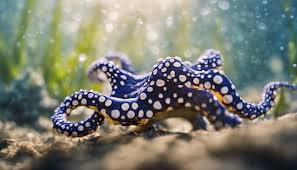Slow loris. They have this look like they’re scared and want to be cuddled, and if they could speak, they’d probably say “Oh my, did I forget to tell you I’m the only poisonous primate?”
Raccoon
Human babies
Human adults
I’d agree but adults are not always cute. They actually rarely are
A blue ringed octopus - they’re a cute looking tiny octopus but quite capable of killing a human.
What’s worst is that after getting bitten by one you will be mentally alert but completely unable to do anything as you feel your body just stop doing things that keep you alive (like breathing)…
as you feel your body just stop doing things that keep you alive (like breathing)…
As I understand it (and to be fair, I’m no octopus scientist or human medical doctor) it’s pretty much just breathing that’s the issue. It doesn’t really directly cause any damage on its own (though the consequences of not breathing can and will of course cause quite a lot of damage in pretty short order)
The venom causes paralysis, basically by (someone correct me if I’m wrong) clogging up the receptors your body uses to send signals to your muscles. It will all get cleared up in about 24 hours or so though.
Problem is that you use some of those muscles to breathe. But if you make it to shore (you also need some of those muscles to swim) and if you get put on a ventilator right away (to do the breathing for you,) your prognosis is actually pretty good and there’s a nearly 100% survival rate (although that has to be two of the biggest “ifs” in all of medicine)
Another thing that comes to mind is your heart also uses muscles to do its thing, and I’m not totally clear on why that doesn’t seem to be a factor here, since paralyzing those muscles is basically just instant cardiac arrest. I did a bit of googling, but I’ll be honest I was in deep over my head in medical jargon and couldn’t make heads nor tails of it. I think my takeaway is that tetrodotoxincan affect the heart muscles, but I guess for whatever reason (dosage? Different kinds of muscles? The way your body processes the venom and moves it around your body? I really don’t know) it just kind of doesn’t, which I guess is lucky for us. I’m kind of hoping someone who speak doctor will maybe see this and give an ELI5 answer to that.
I suspect there’s probably a lot of minor consequences, like I bet your next trip to the bathroom once you recover in going to be some sort of event after your bowels stopped moving for 24 hours, but otherwise it seems like if you hang out on a ventilator for a day unable to move (which, to be fair, is probably one of the last ways I’d want to spend a day, but I guess it narrowly beats out a refrigerated cubby in the morgue) you’re pretty much in the clear to get on with your life.
An anaesthesist friend of mine once told me that there are two kinds of muscles - the ones you can actively control (such as muscles in arms and legs and also the muscles for breathing) and those you cannot, such as your heart and intestine-muscles (around the gut etc.). The latter has a different kind of receptors and isn’t affected by the stuff that they use in hospitals to put you down, but since the breathing is stopped, you’ll always be intubated.
I guess this poison is of the same kind but I don’t know the technicalities…
To explain it in simple terms, your heart doesn’t get its beating signal from the brain, the sinus node takes care of that and is located in the heart. What the brain (and other parts of your body) does is tell the heart to beat faster or slower when required. So the kind of paralysis caused by the octopus doesn’t affect your heart because it doesn’t need to use any external pathways to send the signal to the muscle to contract.
I really want to hug a walrus.
Where do I find you?
Can we watch? I promise will find someone to narrate it.
Blue ringed octopus. Tiny but deadly.
Honey Badger
Classically cute: an otter.
Quick with a mean bite. And can be very ferocious and territorial, even against humans.
Most big cats are extremely cute and do silly kitty-like things.
Big cats can also be more-or-less tamed if they’re raised from a very, very young age by people. The issue, most of the time, is that big cats play just like house cats, and that kind of play can easily be fatal when the cat is the same size or larger than a human. House cats aren’t actually domesticated; they’re just tame, most of the time.
There are a number of IG accounts of wild cat rescues, or other big cats that live with humans, and they’re quite friendly because they were raised with and by people. But they’re still potentially deadly.
We’ve only had cats for 12,000-15,000 years. We’ve had dogs for almost 200,000 years. Give them another 30,000 years and we might have actually domesticated some cats.
I find it more likely that the cats will finish domesticating us
It seems that dogs actually domesticated us far more than anything else, thus far. If cats manage that, hopefully they avoid the trap of being domesticated along with us, because at this point we aren’t the angry chimpanzee, and orangutan hybrid that evolved into Neanderthal and Homo Erectus.
That is part of the reason why I’d get terrified - I have a scar on my leg from a house cat. (A friend of mine brought a kitty that he just adopted here, I was holding the kitty on my arms, Kika saw it as an invader and… well, she attacked the thing nearest to the invader that she could reach, i.e. my leg.) So when I see those big cats I can’t help but imagine a 30x larger house cat, with all the dangers that it entails. And the associated cuteness.
Oh, you are absolutely right. Feral cats can fuck you up, because they have zero qualms about using ultraviolence.
A whale. They’re not particularly aggressive, but their normal motions have the potential to shatter every bone in your body if you approach them wrong, like if you approached them where their tail ends up hitting you. That and I imagine you’d have to be able to swim to approach them in the first place without being terrified, so that rules me out.
A wild haggis.
Aye lethal little beasties.
Nothing more dangerous than a female haggis guarding her neeps.
Beaver. If you know, you know.
I don’t know.
They can bite off your limbs. They don’t seem to be picky about which ones.
There are some very cute cobras.
WATCH A VIDEO OF SNAKES DRINKING WATER RIGHT THE FUCK NOW

The Blue Ringed Octopus is a cutie. Tiny little guy, you could just scoop up with your hand… has one of the most potent toxins on earth, and there is no antidote.
Wolves. Fuckers are fierce but they look like good boys.
They are wild animals, but are almost eerily human.
They are incredibly smart and highly emotionally intelligent. Their families are very much like our own human families, and knowledge is passed down through generations. Some families pass down specialized knowledge that puts them on par with hunter-gatherers. I’d put wolves on the short list of intelligent species who could eventually evolve into a species that could be capable of much more, given a long enough timeline where they self-select for intelligence. Same with elephants, ravens, dolphins, chimps, and whales.
Though that would have to exist on a planet where we didn’t kill most of them and wreck the environment.
Elephants are smart as hell. Give one a canvas and a paintbrush and it will draw with incredible skill
Domesticated dogs are still one of the most deadly species for humans. Wild and smart is a hell of a combination. BTW, one of the other most deadly species for humans are humans, so they being “eerily human” is kind of frightening. Not trying to argue here, just, I still think they are cute and deadly.
Read “A fire upon the deep” by Vernor Vinge. For a multitude of reasons.
My friend had a hybrid once, the goodest of boys. 75% size of an actual wolf, thought himself to be a lapdog. Training involved a pack mentality, but all was well once the pecking order was established.












